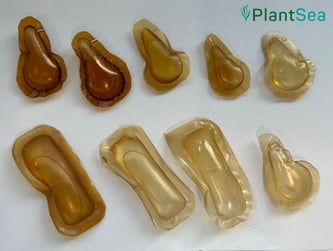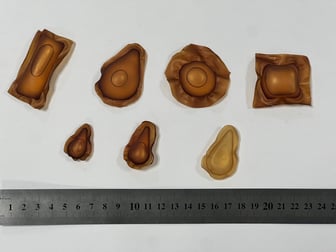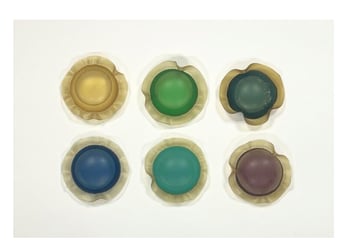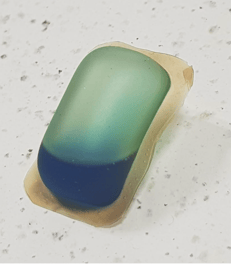
Plastic packaging materials have revolutionised modern life. They have several important properties which make them useful for protecting, storing, and transporting commercially valuable items, such as foodstuffs. For example, plastics can act as a barrier against gases and moisture, helping to extend the shelf life of food products. They are also typically inert and thus safe to use in contact with foodstuffs, as well as being cheap. Transparent plastic packaging films also allow consumers to see the food they are buying making the shopping experience altogether more palatable. In view of these numerous beneficial properties, it is easy to see why plastics have become so widely utilised in our everyday life.
However, this has come at a cost: much of the plastic packaging material we use eventually ends up in the world’s oceans. Here, large pieces of plastic can become entangled with marine mammals and fish, typically leading to injury and starvation. Smaller pieces of plastic packaging - including microplastics - can be ingested by marine organisms. Thus, plastics enter the food chain and also affect the feeding and reproduction of marine organisms (see my recent blog Microplastics: tiny particles causing huge problems). Shockingly, if the present trends in plastic use and disposal continue, it is expected that there will be more plastic than fish in the sea by 2050.
Seaweed-based packaging materials might provide a solution to our plastic packaging pollution problem. Seaweed is a fantastic resource for a variety of reasons. Firstly, it doesn’t require any land to grow on, instead growing in the sea, meaning that production of seaweed does not reduce the amount of land available for other kinds of agriculture. In addition, seaweed is a fast-growing crop which doesn’t require the addition of fertilisers. The growing of seaweed also soaks up and stores carbon leading to de-acidification and re-oxygenation of the oceans.
The question at the moment is whether it is possible to use seaweed to prepare packaging materials that have a lower environmental impact, but which retain many of the important properties of plastic mentioned above. The answer appears to be yes, and several UK-based start-up companies are demonstrating just this in their pioneering work on seaweed-based materials.
Below I explore some the work and technology of several exciting companies working in this field and how they are turning the tide on packaging pollution.
Kelpi
Kelpi are a Bristol based start-up working to transform seaweed into packaging. I caught up with Dr Stefanie Federle, the Chief Scientific Officer at Kelpi, to discuss their technology. Thank you to Stefanie for her time!
The first thing I wanted to know was how their technology works. Stefanie explained that all Kelpi’s biomaterials are 100% bio-based, with seaweed being the main constituent. Their process involves taking seaweed and extracting the carbohydrates, which are then used as the main components of their biomaterials. The carbohydrates present in seaweed have different properties to carbohydrates derived from land-based crops making them suitable for use in the replacement for single use packaging materials.
It is possible to use these seaweed-derived carbohydrates as packaging materials on their own. However, one of the things that sets Kelpi apart from their competitors is their unique chemical functionalisation of these seaweed-based carbohydrates which provides a material with outstanding water barrier properties. This functionalisation also allows Kelpi to tune certain other properties such as the acid resistance and grease resistant properties of the carbohydrates, as well as their ability to act as an oxygen barrier.
With the help of functionalisation, Kelpi have developed a platform of materials which can be applied as coatings to paper, card and fibre materials in order to produce food packaging materials. Outside of food packaging, Kelpi are also working with several large global brands in the cosmetic and personal care space to develop packaging products with long term water barrier properties and extended product shelf life.
Stefanie explains that although there is a balance between the enhanced barrier properties of Kelpi’s materials and fast biodegradability, all Kelpi’s materials remain biodegradable and most importantly are marine safe. In addition, the coated paper and card substrates are also recyclable in standard paper and cardboard recycling plants.
My next question was about the challenges involved in developing this technology. Stefanie explained that the first challenge was to develop the functionalisation process to give a seaweed-based coating with water resistance properties.
Kelpi are currently tackling the challenge of taking their technology from the lab scale to pilot scale. Finding the right production partners and identifying the most suitable scale up equipment is crucial for scaling the technology to the tonne scale. Whilst most biomaterials are currently not yet price competitive with fossil-based materials, Kelpi anticipate that these prices will come down as this technology becomes a mass market technology.
There are also challenges involved with managing consumer expectations. According to Stefanie there is currently a mismatch between the products packaged and the properties of packaging materials. As she explained:
“…if you think of fish in a PET tray, the fish goes off after a week, the PET takes 100s of years to biodegrade”.
Finding the right balance between material performance and biodegradability is therefore necessary to produce both functional and sustainable drop-in replacements for fossil-based plastics that consumers are asking for.
Navigating the world of IP and contractual disputes can also prove testing for a start-up. Ultimately, Kelpi wants to be able to future-proof their technology by getting the broadest patent protection possible for their innovations.
PlantSea
PlantSea, a start-up based in North Wales is turning the tide on plastic pollution using sustainably sourced Scottish seaweed.
They began in 2020 with their first innovation - a single use shampoo pod designed to dissolve as you use them. Replacing a shampoo bottle, which in landfill will take 450 years to degrade, with innovative pods made from seaweed that simply wash away in under a minute. Not only for home use, but these are also the perfect thing for travel and the single use market in hotels and wellness. The pods can be stored in eco-friendly cardboard containers and have a minimum shelf life of six months.


This technology can also be used to replace damaging microplastics found in the films used to make laundry pods and dishwasher tablets. Most customers don’t realise the damage caused by these because the film disappears without trace. However, these are the smallest kinds of microplastics that can end up inside our waterways.
They are also working on a mulch film to impact the agricultural industry where plastic mulch, which cannot be recycled, is regularly discarded or ploughed back into the soil with devastating effects on the soil, wildlife and waterways.
To make their process entirely circular, nothing goes to waste. All of the bi-products from film making have been made into paper based alternatives to reduce the demand for virgin wood pulp.
In 2023 PlantSea won the North Wales Start Up of the year and were highly commended for best SEIS Investee company. Whilst co-founder and COO Dr Alex Newnes was also the winner of the Young Innovators Next Steps Awards and runner up in the Forty Under 40 Award.
FlexSea
FlexSea have created a sustainable seaweed-derived biomaterial that replaces plastic film packaging and degrades in a matter of weeks. These films are envisaged for use in applications such as food packaging, packaging of dry items such as screws and nails, packaging of cosmetics and textiles and dry cleaning.
Their packaging is home compostable and naturally biodegrades in both marine and soil environments, without the need for specialised industrial composting facilities. The material is even edible! FlexSea emphasise that decomposition of their product does not harm the environment and that, on the contrary, the high nitrogen content of these materials fertilises the soil, promoting healthy and robust growth of vegetation.
The material produced is a transparent flexible film which can be tailored and customised to accommodate customer needs. Something which sets them apart from some of their competitors is that their materials can also be printed and coloured using natural dyes and can also be thermo-sealed for making sachets or lids.
FlexSea have a recently-published patent family which has claims relating to a specific composition comprising a seaweed extract and additives including at least one plasticizer, at least one antimicrobial agent, at least one gelling agent and at least one adjuvant.
MarinaTex
MarinaTex have developed a bioplastic made from red agar and fish processing waste, with the agar functioning as a natural binder. This new material is envisaged as an alternative to plastic films in bags, sandwich packaging and wraps. The material is transparent and will biodegrade in a soil environment in under 6 weeks. Amazingly, material tensile tests show that this material is stronger than LDPE, which is commonly used in plastic bags.
The MarinaTex website explains that using red algae as the binder has the advantage over land-based binders that it does not need any fresh water, fertile land or fertilisers to grow and can grow all over the world in the oceans.
MarinaTex were the recipient of the James Dyson Award in 2019 for this technology. Congratulations MarinaTex!
Conclusion
Seaweed technology is clearly an exciting area of innovation. Even environmentally conscious consumers currently use too much fossil-based packaging. Therefore, to mitigate the effect on our environment, we need a more environmentally friendly alternative to plastic based single use packaging: seaweed-based materials provide such an alternative.
In this exciting area of technology, there are clearly opportunities for everyone to develop new and exciting materials for specific niche applications. We very much look forward to hearing how this technology and these companies develop over the coming years.


Imagery provided by PlantSea.
Thomas is an associate patent attorney with experience in drafting and prosecution of patent applications for a range of European and international clients in the fields of chemistry, biochemistry, pharmaceuticals and materials. He has also worked on FTOs and attended proceedings before the EPO. Thomas holds a Masters (MChem) and doctorate (DPhil) from the University of Oxford in which he specialised in biocatalysis.
Email: thomas.lonsdale@mewburn.com
Sign up to our newsletter: Forward - news, insights and features
Our people
Our IP specialists work at all stage of the IP life cycle and provide strategic advice about patent, trade mark and registered designs, as well as any IP-related disputes and legal and commercial requirements.
Our peopleContact Us
We have an easily-accessible office in central London, as well as a number of regional offices throughout the UK and an office in Munich, Germany. We’d love to hear from you, so please get in touch.
Get in touch

